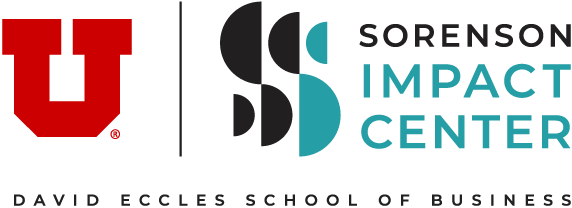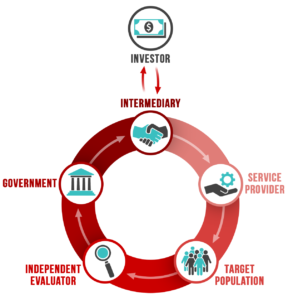The Innovative Finance for Translational Research (IFTR) program is a collaboration between the University of Utah’s Office of the Vice President for Research (VPR) and the Sorenson Impact Center (SIC) housed at the David S. Eccles School of Business. This program is a first-of-its-kind collaboration between a research university and an impact finance center. Utilizing innovative finance and outcomes-based financial models, this program seeks to connect evidence-based, social and environmental interventions with public and private funding to implement and scale those interventions within the community.
Important Deadlines
Application Deadline: February 17, 2023
Pre-feasibility scans: March 10, 2023 (Open request for faculty proposals)
Faculty candidates chosen for full feasibility assessment: September 2023 to October 2023
Final Projects chosen: June 2024 to July 2024
Who is heading up this program at the University of Utah?
This program is jointly run by the Office of the Vice President for Research and the Sorenson Impact Center
housed at the David S. Eccles School of Business at the University of Utah.
-
The Innovative Finance for Translational Research program is a collaboration between the University of Utah’s Office of the Vice President for Research (VPR) and the Sorenson Impact Center (SIC) housed at the David S. Eccles School of Business. This program is a first-of-its-kind collaboration between a research university and an impact finance center. Utilizing innovative finance and outcomes-based financial models, this program seeks to connect evidence-based, social and environmental interventions with public and private funding to implement and scale those interventions within the community.
An independent evaluator determines if the outcome metrics have been achieved during implementation, and if so, the government will pay back the private funders with a modest return on investment. Payments are only made if outcomes are achieved. In this way, the risk of performance or success is transferred from government to the private funders. Programs and interventions that are evidence-based or promising and emerging interventions are potential candidates for community translation through this innovative financing approach.
Previous outcomes-based financing projects have focused on a variety of sectors such as homelessness, workforce development, early childhood, health, maternal and child health, wildfire prevention and water conservation. Other fields might also be promising candidates for an outcomes-based financing project.
The VPR and SIC will issue a Request for Ideas (RFI) soliciting candidates for a Pre-Feasibility Scan in early January. Projects selected for a Pre-Feasibility Scan will be evaluated according to a set of criteria to determine whether they are a good candidate for a full Feasibility Assessment. Projects chosen for a full Feasibility Assessment will undergo an in-depth process to determine if the project is feasible for implementation into a community setting utilizing outcomes-based financing, or if appropriate, an alternative innovative financing structure. Projects deemed feasible will move towards implementation.
Please see the FAQ for a list of criteria that we are looking for in potential candidates. Interventions typically exhibit evidence of improving outcomes for the treatment groups (if a social or health intervention), resulting in monetary fiscal savings and/or a societal benefit.
Note: The Sorenson Impact Center, any of its affiliates, and the University of Utah are not investors or capital holders and will not be directly contributing funds to any intervention.

Office of the Vice President for Research
The VPR Office provides resources and support to foster an environment of creativity, discovery, and advanced knowledge.

The Sorenson Impact Center
The Sorenson Impact Center (SIC or “the Center”) helps organizations achieve their impact vision.
What is outcomes-based financing?

Outcomes-based financing is an innovative financial model that shifts how government and other funders pay for interventions. Rather than the government paying for a program or intervention upfront, private funders provide the working capital for implementation, specific measurable outcomes measures are established in contract upfront, an independent evaluator assesses if the outcome has been achieved during implementation, and if so, the government pays back the investors with a modest return that was agreed upon at the establishment of the contract. Since payments are only made once outcomes have been achieved, the risk of performance is shifted from the government to the upfront private funders. Programs and interventions also do not bear the risk of performance as the working capital to implement the program was provided at the beginning of the program.
As an illustration, in the diagram above, an intermediary organization manages the project, collects upfront working capital from investors, provides that upfront capital top a service provider, the service provider delivers the intervention to the target population, an independent evaluator determines if the outcomes have been achieved, and if so, government pays the intermediary who passes the payments on to the original investors.
Innovative Finance Translational Research FAQ
-
Previous outcomes-based financing projects have targeted issues related to child welfare, the environment, homelessness, workforce development, criminal justice/recidivism, early childhood health and education, maternal health, and health/mental health.
Other potential focus areas include: secondary and higher education, youth or teen services, civil justice, nature conservation, clean energy, and projects related to the social determinants of health.
-
To be feasible for an outcomes-based financing model, an intervention should have:
- A defined target population
- Measurable outcomes within the project period
- Access to administrative, demographic, financial, and implementation data
- An evidence-based intervention or promising emerging practice
- A service provider capable of implementing or scaling the intervention
- Monetary fiscal savings and/or societal benefit
-
This project will have several sequential phases:
1. Pre-Feasibility Scans
- January 9th, 2023: Open the request for faculty proposals and begin the Pre-Feasibility Scan phase
- Pre-Feasibility Scan: February 2023 - August-September 2023
2. Full Feasibility Assessment
- Candidates chosen: September - October 2023
- Full Feasibility Assessment: October 2023-June 2024
3. Transaction Structuring and Implementation
- Projects chosen: June - July 2024
- Approximate time to implementation: up 9 months
-
The funding availability for each project will depend on the cost of implementation, the size of the need and target population, and the preferences of funders interested in the intervention or project. While funding is not guaranteed, most outcomes-based financing projects receive between $5-$30 million in funding.
Note: If your project advances through the pre-feasibility and feasibility phases, the Sorenson Impact Center (SIC) will begin outreach to potential investors and payors. No project will receive direct funding from either the Sorenson Impact Center, the University of Utah, or any of its affiliates. The center is not an investment organization and does not hold any capital. Advancing to the structuring phase is not a guarantee of funding
-
The Sorenson Impact Center mission includes offering a world-class student program to train the impact leaders of tomorrow. This project will integrate a student cohort into all aspects of the project. The cohort will be trained to perform background research, quantitative and qualitative data analysis, assess the needs of target populations, evaluate the rigor of the evidence for the interventions, build financial models and contribute to the assessment of feasibility. Students will work with, and be supervised by, full-time SIC professional staff. The Center is interested in student applicants from a variety of disciplines and backgrounds to bring a unique perspective to the background research process.
IFTR Town Hall
The Office of the Vice President for Research (VPR) and the Sorenson Impact Center (SIC) held an informational town hall on the Innovative Finance for Transitional Research (IFTR) program. Information discussed included program requirements, examples of projects and more.
- Watch the town hall here.
- View the town hall PowerPoint presentation here.
QUESTIONS? CONTACT US!
This program will be led by Janis Dubno, Managing Director of Impact Finance at the Sorenson Impact Center.
Janis' Bio and Gabe's Bio
Please direct all questions to:

